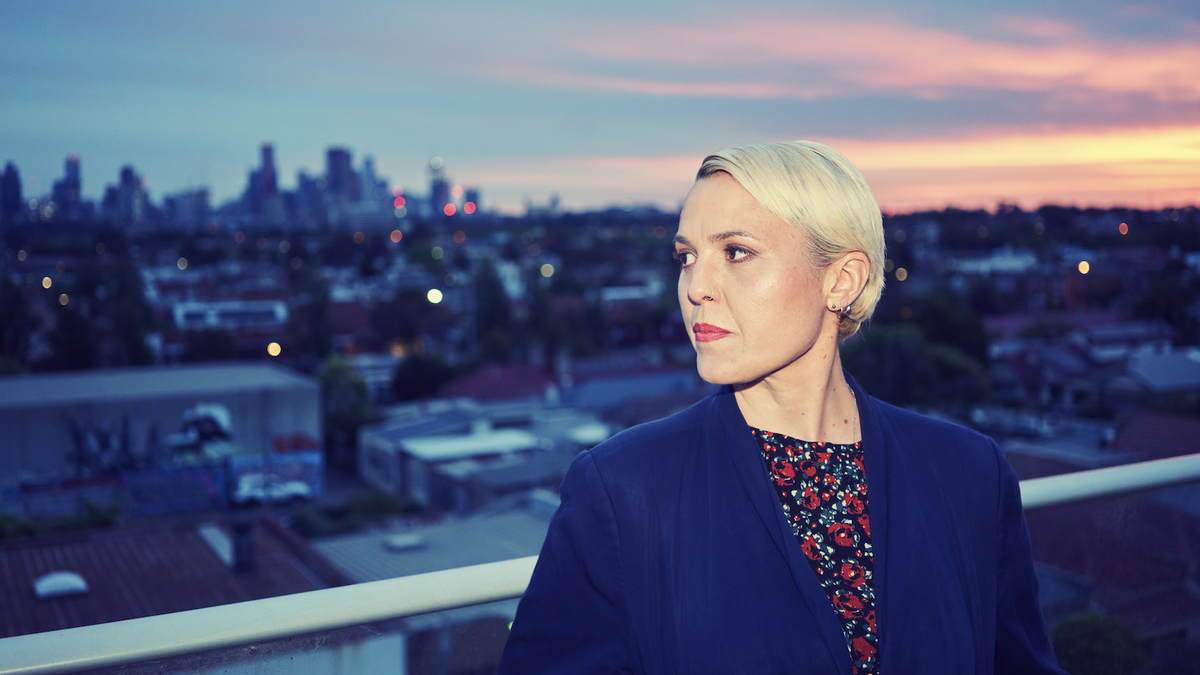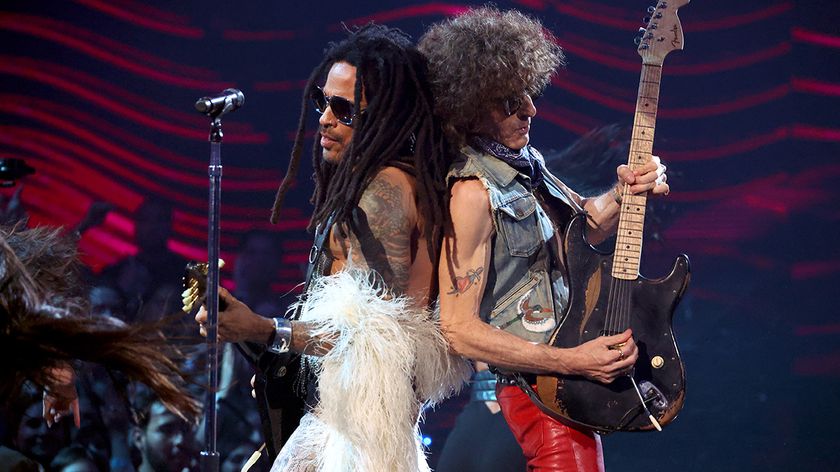Liz Stringer: “I didn’t have any design for the outcome, which was very different to other records I’ve made”
The soul-bearing new opus from Liz Stringer is some of her strongest, and undoubtedly most poignant, work to date

It's been a storied 15 years for Melbourne‑native folk goddess Liz Stringer, with a string of critically cherished studio and live albums, a devoted cult following on local shores (though as NME’s David James Young attests, “she deserves her own megachurch”) and a phenomenal collaborative project with fellow indie-rockers Mia Dyson and Jen Cloher (nonchalantly dubbed Dyson Stringer Cloher). But despite already establishing a remarkable legacy, it’s on Stringer’s newest effort, First Time Really Feeling – her first solo full-length in half a decade – that she truly opens herself up to the world. In more ways than one, you could call it the debut album from Liz Stringer 2.
On a sonic wavelength, First Time Really Feeling is Stringer’s sharpest, crispiest and most instantly earwormish effort – the soundscapes are cool and colourful and cheery – though thematically, it’s a clear-cut gut-punch of raw, lucid emotion. Stringer always tends to wear her heart on her sleeve, but in the past there’s always been a few degrees of separation – a lens of metaphor or narrative frame through which she filters her ruminations; but here, her thoughts are completely bare. And it makes sense especially given the album’s origin: when she was writing it, Stringer was going through some of the biggest and most transformative personal changes she ever had. More confident than ever to embrace her mental turbulence through art, First Time Really Feeling is apt title.
As the world settles in with the record, Stringer caught up with Australian Guitar to chat about how First Time Really Feeling came to life.
Why did you decide to keep this record on the shelf for a while?
Well, when I made it, I didn’t have management, I didn’t have a team at all, I had just moved to Canada, and I was feeling pretty burnt out; I wasn’t sure whether I wanted to – or even could – keep working as a musician. I was very tired, and lot of personal things had come to a head… I just knew I wasn’t in the right headspace to put a record out. I really wanted to give this album the support it deserved, going into the world, and if I couldn’t do that, then there wasn’t any point in putting it out – and that included having really sound mental health.
I started working with my management at the start of 2020, and we were like, “Let’s put a plan together, and let’s take our time – we don’t have to rush to get it out.” So it was always going to be now – but as it turns out, it was good timing anyway, just as far as touring was concerned.
And y’know, I just feel better – when I made the album, I’d just turned 38, and I was at that point I think a lot of people get to where they just think, “What am I doing?” It’s sort of like the end of your youth, so to speak, and the start of this great new phase – but it hasn’t started being all that great yet. I just had to really knuckle down and face some stuff before I was comfortable with moving forward as a musician.
How did you want this record to encapsulate the experiences you’d had leading up to it?
I didn’t used to write much from my own perspective. I’m quite a prolific writer, but I’ve always been really interested in people, and the minutiae of life, common experience and all that sort of stuff, so I’ve written a lot from other perspectives – partly because I think I just didn’t have a very good access to my own inner world, y’know?
Get The Pick Newsletter
All the latest guitar news, interviews, lessons, reviews, deals and more, direct to your inbox!
I got sober in 2016, and that was a big, big change for me. It precipitated an enormous period of self‑development – and part of that was becoming really connected with myself, so I started writing really personally. I didn’t set out to, but I was suddenly able to metabolise all this stuff that I hadn’t utilised until then. It definitely hadn’t come naturally to do in the past. Some of these songs take place in those last couple of years of drinking, where things were really not good. I don’t think I necessarily set out to capture that time, but I think inevitably you do that if you’re writing very personally, because whatever’s happening in your life is being captured naturally.
So being able to step back and look at the record as it exists now, do you feel like it hits a little harder, or feels a little more intimate than some of your earlier material?
Oh, yeah – like, in a big way. Some of the songs were quite new when I was going into the studio – I was writing right up until I was in the vocal booth – but some of them I’d been playing for a while, and the songs that I had played over those two or three years, longtime supporters of mine were really struck by the difference. Again, it’s just about having that access – and not only a connection with myself, but a connection with other people. I think I’m the type of artist that has always relied on that connection with people, but it’s just so much cleaner now, and these songs are so much more direct.
I think that their impact is at least more immediate, y’know? And that’s been amazing, to see the change in myself reflected in the reaction to my work – that’s been really moving on a lot of levels, and very affirming. I’ve always known this objectively, as a writer and as a lover of art, but y’know, you connect with things that are real – that ride along the straight line between me as an artist and you as a consumer of art.
Being in the headspace you were when you wrote a lot of these songs, did you feel more confident about taking some creative risks?
It’s kind of hard to remember exactly how I felt at the time, but I can remember thinking, “I don’t really care if this is the last thing that I do.” I didn’t have any design for the outcome, which was very different to other records I’ve made. So there’s probably a bit of a liberation in there. I remember that with some of the stuff, when I wrote it, I was like, “Ah, this is too…” I mean, none of it is shocking, but y’know, sometimes it involves people I know, and I’d never had any second guessing about putting material out before. It’s been a really interesting process because of that – because of the personal nature of it all.
What guitars did you have in the studio for this record?
I have a hollowbody Ibanez – a Japanese 335 copy, basically – and that was the only guitar of mine that I had over there [in Canada]. And it just sounded beautiful. On some of the slower, sort of richer, more ballad-y songs, I’m playing that. And then there’s a guy in Toronto who’s friends with Chris Stringer, who produced this album, who makes beautiful custom Teles – his name is Alastair Miller – and Chris has an amazing guitar that Alastair made for him. So we used that a lot, we used a Firebird for a couple of things… I seem to remember there being a Flying V in there at some point…
But that Tele – I really love Teles, but some of them can lack a bit of punch. They can be quite toppy and thin – which is sometimes a great sound – but the one Alastair made had this really beautiful thick, comfortable neck, and heaps of guts. And so it was able to cut through, but also create some really beautiful mids that just gave the songs a bit more power.

Ellie Robinson is an Australian writer, editor and dog enthusiast with a keen ear for pop-rock and a keen tongue for actual Pop Rocks. Her bylines include music rag staples like NME, BLUNT, Mixdown and, of course, Australian Guitar (where she also serves as Editor-at-Large), but also less expected fare like TV Soap and Snowboarding Australia. Her go-to guitar is a Fender Player Tele, which, controversially, she only picked up after she'd joined the team at Australian Guitar. Before then, Ellie was a keyboardist – thankfully, the AG crew helped her see the light…

“We had 15 minutes left, and it was time to go… I just started playing that riff. Then Lenny goes, ‘Whoa, what’s that?’” Lenny Kravitz guitarist Craig Ross reveals the serendipitous roots of a Kravitz classic

“The concept of the guitar duel at the end was just appalling”: Crossroads is an essential piece of '80s guitar lore, but not every guitar legend was a fan of the film








